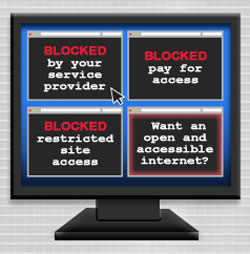Net Neutrality Vote in Congress This Week


The fight to ensure that the Internet remains a fair and neutral medium for free speech and commerce is facing a crucial new test. Later this week — most likely Wednesday — the Senate will vote on whether to nullify network neutrality protections created by the Federal Communications Commission (FCC) last December.
Network neutrality is a crucial issue, as we explained in this report. Opponents, including big telecommunications companies who run the wires over which our data flows, are hoping to make money by manipulating the flow of that data. Century-old “common carrier” laws block such manipulation on the phone system and other crucial facilities, and refusing to extend such protections to the Internet is a recipe for mischief that will damage free speech, hurt consumers, and dampen innovation.
The vote will be taken under something called the Congressional Review Act (CRA), which sets up a streamlined legislative process by which Congress can repeal a regulation issued by an executive agency. The House already voted to overturn the rules in April. If the Senate goes along — and under the CRA the repeal motion is not subject to filibuster and so needs 50 votes not the usual 60 — it would it would still need to be signed by President Obama, who has been a strong supporter of open internet protections and has promised to veto this gift to the big telecoms if Congress passes it.
Even so, passage of this repeal would represent a real blow to open Internet protections. It has become clear that the fight for an open Internet will be a protracted one — partly because last year the FCC, faced with fierce corporate lobbying, flinched and issued flawed and limited protections against discriminatory Internet interference. Now, using the false claim that the administration is seeking to “regulate the Internet” (in fact it is seeking to protect Internet users from abuses by those who happen to control the wires over which data flows), opponents want to roll back even those limited rules.
Even with a presidential veto, congressional approval of a regulatory rollback on this front will further weaken FCC resolve, undercut the legitimacy of these key open-internet protections, and give momentum to those who might want to attack them through other means such as appropriations bills (which would be much harder for the president to veto).
Congress needs to side with all the people who use the Internet to exercise their free speech rights and produce the next generation of disruptive innovation — and not with big, deep-pocketed incumbent telecommunications companies. Ask your senators to vote against this proposed repeal of open internet protections by taking action now.
Learn more about Net Neutrality: Sign up for breaking news alerts, follow us on Twitter, and like us on Facebook.



